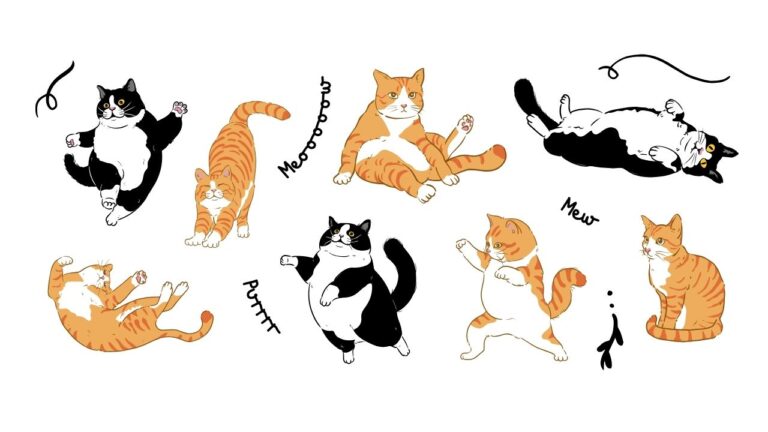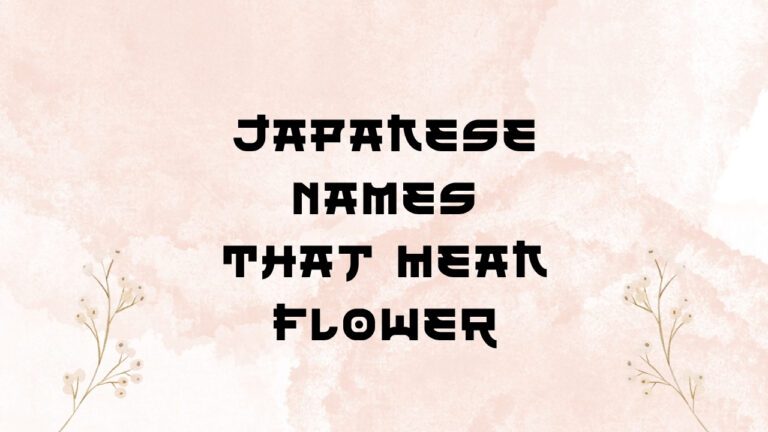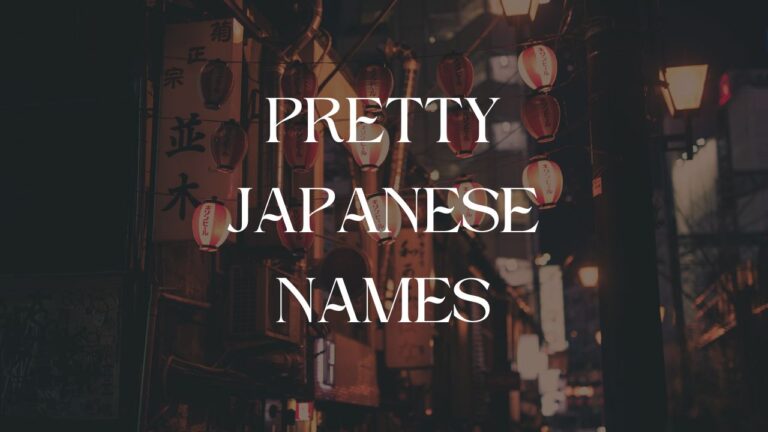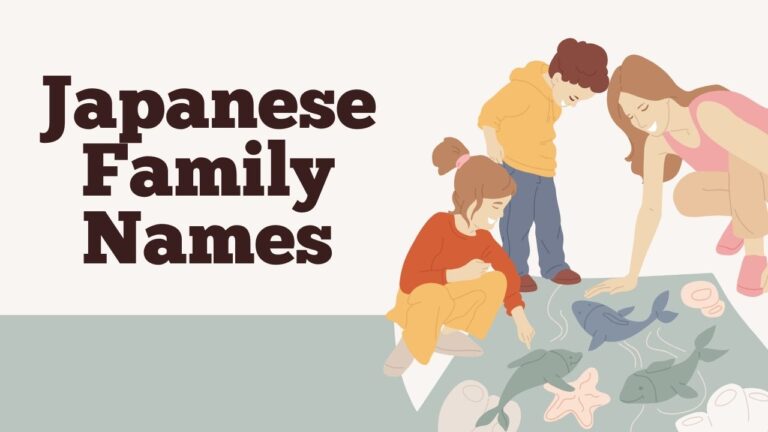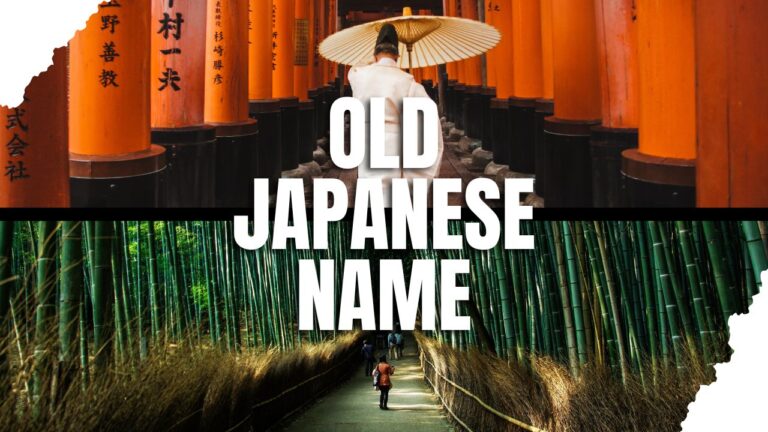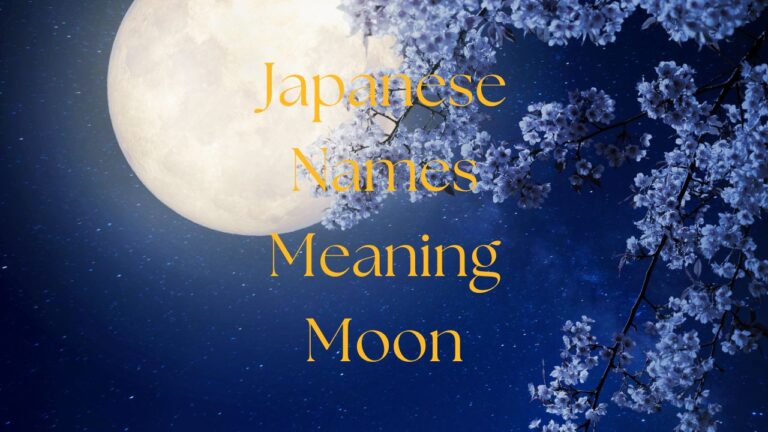175+ Japanese Names That Start With M– Historical & Spiritual
Choosing a name is a special journey, especially when exploring the charm of Japanese names that start with M. These names are not only beautiful in sound but also carry deep cultural meanings rooted in nature, virtues, and tradition.
Whether you’re searching for Japanese names that start with M girl or looking into strong and meaningful options for Japanese names that start with M boy, this guide offers a carefully curated list to help you find the perfect fit.
From soft and elegant to bold and timeless, you’ll also discover Japanese names that start with M and meanings that reflect the unique personality and story behind each name.
Also Read:150+ Japanese Family Names: Meanings, History & Cultural Origins
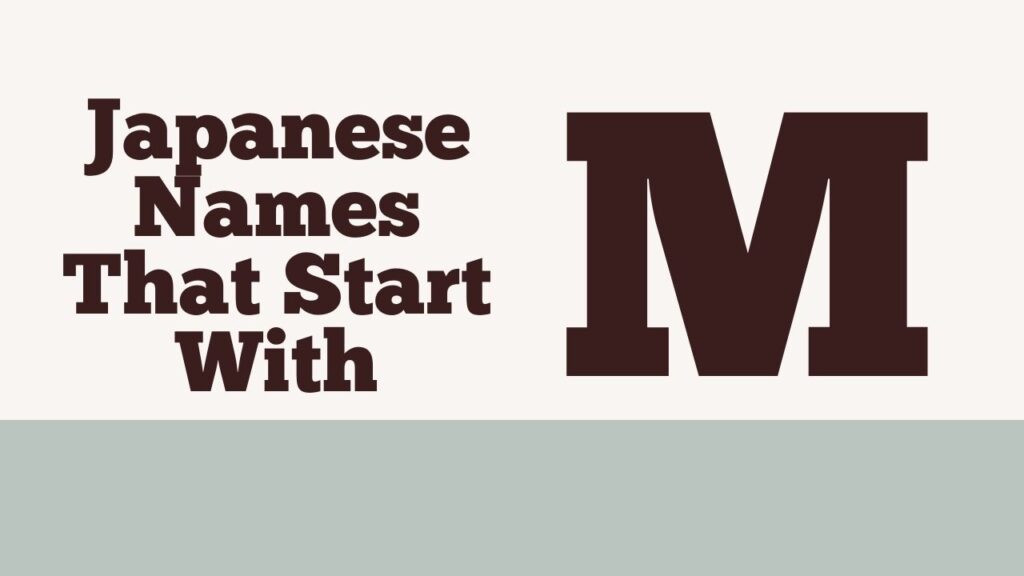
female Japanese names that start with M
- Miyuki (美雪) – “Beautiful snow”
A gentle, poetic name often associated with winter and purity. - Misaki (美咲) – “Beautiful blossom”
Commonly used to evoke beauty and blooming nature, often linked with spring. - Megumi (恵) – “Blessing” or “Grace”
A name filled with kindness and positive energy. - Mai (舞) – “Dance”
Simple yet elegant, often linked with traditional Japanese performing arts. - Mika (美香) – “Beautiful fragrance”
Combines beauty and pleasant aroma, often linked with flowers. - Miu (美雨) – “Beautiful rain”
A modern-sounding name with a poetic and serene vibe. - Marina (真里奈) – “Truth + village + name”
A Western-influenced name adapted with Japanese kanji, giving it a stylish touch. - Maho (真帆) – “True sail”
Symbolizes truth and smooth journeys. - Minami (南) – “South”
Often evokes warmth, peace, and sunny landscapes. - Mizuki (瑞希) – “Auspicious hope”
Popular and modern, combining good fortune with optimism. - Mirei (未来) – “Future”
A hopeful, forward-looking name that represents dreams and aspirations. - Momoka (桃花) – “Peach blossom”
Symbolizes beauty, femininity, and youth. - Mitsuki (美月) – “Beautiful moon”
A romantic name tied to nature and night beauty. - Miyako (都) – “Capital city”
Historically elegant and noble, often linked to Kyoto. - Madoka (円) – “Circle” or “Harmony”
Represents wholeness, peace, and balance. - Mako (真子) – “True child”
A gentle name expressing sincerity and innocence. - Mahiro (真尋) – “True + search”
Implies a deep soul who seeks truth or purpose. - Mami (麻美) – “Hemp + beauty”
A traditional name associated with strength and grace. - Mitsue (光江) – “Light river”
Symbolizes flowing beauty and brilliance. - Miu (心羽) – “Heart + feather”
A modern poetic name expressing light-hearted emotion. - Mizue (瑞恵) – “Auspicious blessing”
Reflects good fortune and kindness. - Masami (雅美) – “Elegant beauty”
Classic and graceful, often used for refined characters. - Mei (芽依) – “Sprout + rely”
A fresh and modern name representing growth and connection. - Mina (美奈) – “Beautiful harmony”
A globally appealing name that remains deeply Japanese. - Mirei (美玲) – “Beautiful + lovely”
Reflects elegance, charm, and delicate beauty.
male Japanese names that start with M
- Masaru (勝) – “Victory”
A strong and classic name symbolizing triumph and success. - Makoto (誠) – “Sincerity” or “Truth”
Often associated with honesty and integrity; a timeless choice. - Masashi (正志) – “Righteous will”
A popular name with a sense of strong purpose and justice. - Masaki (正樹) – “Righteous tree”
Symbolizes strength, growth, and virtue. - Minato (湊) – “Harbor”
A modern and popular name, calm and serene like a peaceful port. - Masato (真人) – “True person”
A name that reflects authenticity and dignity. - Michio (道夫) – “Man of the path”
Traditional and thoughtful, indicating someone with life direction. - Masanori (正則) – “Lawful and correct”
Conveys discipline and strong character. - Masaki (昌樹) – “Flourishing tree”
A different kanji variation of Masaki, showing prosperity and life. - Masahiro (雅弘) – “Elegant and broad”
A refined name suggesting grace and generosity. - Mitsuru (満) – “Full” or “Complete”
Symbolizes completeness and abundance. - Masanobu (正信) – “Righteous faith”
Often given to boys with strong moral or spiritual grounding. - Masafumi (正文) – “Righteous writing”
Indicates intellectual strength and literacy. - Masaki (政樹) – “Political tree”
A strong-sounding name associated with leadership or wisdom. - Masami (正巳) – “Righteous self”
Carries a sense of personal strength and self-discipline. - Masakazu (正一) – “Right and harmonious”
Traditional name reflecting order and balance. - Masanobu (雅信) – “Elegant belief”
Combines refinement with personal conviction. - Mitsutaka (光隆) – “Shining nobility”
A regal and elegant name, often found in historical contexts. - Masachika (正親) – “Righteous and intimate”
A formal-sounding name often linked to older generations or tradition. - Masanaga (正永) – “Eternal justice”
Reflects long-lasting values and righteousness. - Masamune (政宗) – “Government + clarity”
A famous samurai name, strong and noble in tone. - Michitaka (道隆) – “Noble path”
Evokes a sense of guided wisdom and honor. - Masayuki (正幸) – “Righteous happiness”
A cheerful and moral name that suggests good fortune. - Masakuni (正邦) – “Right nation”
Traditional name often linked with patriotism and leadership. - Masaru (優) – “Excellence” (different kanji from previous Masaru)
A more modern interpretation, symbolizing skill and grace.
unisex Japanese names that start with M
- Makika (真希花) – “True hope flower”
A modern and soft-sounding name combining truth and beauty. - Mikasa (三笠) – “Three bamboo hats” or refers to Mount Mikasa
A poetic and place-based name with historical depth. - Mizuna (水菜) – “Water greens”
A nature-based name that feels fresh and earthy. - Minori (実り) – “Harvest” or “Fruitfulness”
Reflects abundance and reward; popular for both genders. - Masaki (真咲) – “True blossom”
A soft and natural-sounding name suited for any gender. - Misora (美空) – “Beautiful sky”
Elegant and calm, often linked with freedom or clarity. - Mikuri (実栗) – “True chestnut”
A rare name that connects with nature and autumn. - Miharu (美春) – “Beautiful spring”
Symbolizes new beginnings and joy, used across genders. - Maito (舞翔) – “Dance + soar”
Modern and energetic, suitable for a free-spirited personality. - Mashiro (真白) – “Pure white”
Minimalist and gentle, conveying purity and peace. - Mizuho (瑞穂) – “Abundant rice”
A poetic name tied to blessings, agriculture, and harmony. - Mikako (未来子) – “Child of the future”
Gender-neutral when written this way, with a futuristic feel. - Momiji (紅葉) – “Autumn leaves”
A beautiful seasonal name popular for nature lovers. - Mio (澪) – “Waterway” or “channel”
Calm, sleek, and used in both masculine and feminine contexts. - Masame (真雨) – “True rain”
A rare and poetic name that feels serene and introspective. - Masae (正恵) – “Righteous blessing”
Used for any gender with a strong and classic meaning. - Mikage (御影) – “Honorable reflection”
A name with spiritual and noble undertones. - Mimori (未森) – “Untouched forest”
Evokes nature, mystery, and purity. - Mitsue (光枝) – “Shining branch”
A delicate name symbolizing growth and brilliance. - Mahina (真陽菜) – “True sunlight greens”
A Hawaiian-influenced modern name now seen in Japanese usage too. - Miuna (澪菜) – “Waterway + greens”
Evokes freshness and calm; modern and stylish. - Mikina (美希菜) – “Beautiful hope greens”
Balanced between nature and aspiration, works for any gender. - Masuna (真砂) – “True sand”
Minimalist and grounding; a rare and earthy unisex name. - Mitsuna (光菜) – “Light vegetable”
Nature-based and symbolic of nourishment and vitality. - Mihana (美花菜) – “Beautiful flower greens”
A vibrant, cheerful name that feels natural and positive.
popular Japanese names that start with M
- Manaka (真中) – “True center”
A well-loved name reflecting balance and sincerity. - Masaya (正也) – “Righteous and also”
A strong, respectful name often given to boys, but also used unisex. - Miyabi (雅) – “Elegance” or “Graceful refinement”
A timeless and refined name, popular for its cultural tone. - Marin (茉凛) – “Jasmine + cold beauty”
A modern and stylish name with soft, floral vibes. - Mahiro (真宏) – “True vastness”
A modern name evoking big dreams and potential. - Momone (百音) – “Hundred sounds”
Symbolizes musical harmony and richness in expression. - Masaki (雅貴) – “Elegant and noble”
Popular for its graceful and dignified tone, mostly male. - Mirei (実玲) – “Fruit + lovely”
A sweet and elegant name popular for girls in recent years. - Mao (真央) – “True center”
Simple, gender-neutral, and increasingly used in modern times. - Miyuna (美優菜) – “Beautiful gentle greens”
Stylish and nature-inspired, often chosen for girls. - Masaru (優大) – “Kind and great”
A modern variation expressing strength and kindness. - Moka (萌花) – “Budding flower”
Soft and charming, representing youth and growth. - Miu (美結) – “Beautiful connection”
Reflects bonding and beauty; popular among girls. - Masahide (正英) – “Righteous excellence”
A dignified, respected name mostly used for boys. - Mayuki (真雪) – “True snow”
Elegant and serene, evoking calm and winter beauty. - Miyuu (美優) – “Beautiful and gentle”
A widely loved name in the modern era for its tender vibe. - Masami (政美) – “Political beauty”
A well-balanced name often associated with leadership and grace. - Maika (舞香) – “Dance and fragrance”
A vibrant, cheerful name popular among girls. - Mitsumi (光実) – “Shining fruit”
A poetic and meaningful name that fits either gender. - Masanari (正成) – “Righteous success”
A noble-sounding name, often seen in traditional families. - Mihane (美羽音) – “Beautiful feathered sound”
A modern, airy name reflecting grace and movement. - Masamiya (真清夜) – “True pure night”
A mystical and poetic name rising in popularity. - Mizuka (水香) – “Water fragrance”
A peaceful, soft name that evokes nature and freshness. - Masatora (正虎) – “Righteous tiger”
A bold and powerful name that’s becoming trendy again. - Mikana (美佳菜) – “Beautiful good greens”
A modern and pretty choice that’s loved for its harmony.
historical Japanese names that start with M
- Masamune (政宗) – “Righteous clarity”
A legendary name made famous by Date Masamune, a powerful daimyo in the Sengoku era. - Mitsuhide (光秀) – “Shining excellence”
Known from Akechi Mitsuhide, the general who betrayed Oda Nobunaga. - Michizane (道真) – “True path”
Refers to Sugawara no Michizane, a Heian-era scholar and poet deified as Tenjin. - Morinaga (盛長) – “Flourishing longevity”
A historical samurai name found in the Kamakura period. - Masatsura (正行) – “Righteous conduct”
Known from Kusunoki Masatsura, a heroic figure in the Nanboku-chō period. - Muneyuki (宗行) – “Religious conduct”
Classical name from a Heian period poet, part of the Thirty-Six Immortals of Poetry. - Michinaga (道長) – “Long path”
A Fujiwara regent, Fujiwara no Michinaga, who held great political power in the Heian era. - Moronobu (守信) – “Protected faith”
Refers to Hishikawa Moronobu, a famous Edo-period ukiyo-e artist. - Masamori (正盛) – “Righteous prosperity”
A warrior name used by samurai lords during the feudal period. - Masazane (政真) – “Political truth”
A name often found among noble families and daimyo clans. - Motonari (元就) – “Original achievement”
Famous from Mōri Motonari, a brilliant strategist of the Sengoku era. - Masanobu (政信) – “Political faith”
Seen among historical retainers and feudal officials. - Mitsunari (光成) – “Shining success”
Refers to Ishida Mitsunari, a key figure in the Battle of Sekigahara. - Masahisa (正久) – “Righteous longevity”
A dignified name found in noble lineages. - Mitsuhisa (光久) – “Bright eternity”
Historically used among the Satsuma domain lords. - Masakado (将門) – “Military gate”
Refers to Taira no Masakado, a rebel noble of the Heian period. - Masatoki (正時) – “Righteous time”
Classical name used in court or warrior ranks. - Moriyoshi (護良) – “Protective goodness”
Refers to Prince Moriyoshi, a Kamakura period warrior-prince. - Masachika (政親) – “Political intimacy”
Seen among middle to late Edo-period officials. - Masayori (政頼) – “Political reliance”
A retainer name used in clan-based historical records. - Munemitsu (宗光) – “Religious light”
Known from Mutsu Munemitsu, a Meiji-era diplomat and statesman. - Moriyasu (盛康) – “Flourishing peace”
Often seen in older provincial warlord families. - Mitsutsune (光常) – “Constant light”
Historical noble or samurai-style name emphasizing stability. - Masakatsu (正勝) – “Righteous victory”
Strong warrior name used across various eras. - Morotaka (師高) – “Noble height”
Refers to Fujiwara no Morotaka, an official and nobleman in the Heian court.
rare Japanese names that start with M
- Maoha (真央羽) – “True central feather”
A rare, elegant name with poetic flair and a soft tone. - Masune (真根) – “True root”
Deep and grounded, symbolizing a strong foundation. - Mihaya (美颯) – “Beautiful swift wind”
Unique and fresh, associated with elegance and freedom. - Makine (槙音) – “Black pine + sound”
Nature-inspired, calm, and musical in tone. - Mitsuka (光華) – “Radiant light + flower”
A poetic and gentle name not commonly seen. - Mibu (壬生) – “Water element birth”
Historically linked with the Mibu clan, but rarely used today. - Miharu (実陽) – “Fruitful sunshine”
Warm and vibrant, yet very rare in modern usage. - Maomi (真臣) – “True retainer”
Uncommon name with an old-world, loyal feeling. - Masui (真翠) – “True + emerald”
Elegant and rare, symbolizing natural beauty and truth. - Mizune (水音) – “Water sound”
Delicate and quiet name often associated with nature and calm. - Minaka (水中) – “Within water”
Unique and peaceful, with deep nature symbolism. - Maeka (舞栄華) – “Dance + flourishing elegance”
A name full of life and style, rarely encountered. - Mikanae (美奏慧) – “Beautiful performance + wisdom”
A modern-sounding name with artistic and intellectual tones. - Masuru (真澄) – “True clarity”
Classic but rare, symbolizing transparency and sincerity. - Mishiro (美白) – “Beautiful white”
Pure and graceful, yet very rarely chosen due to its simplicity. - Meiya (芽弥) – “Sprout + blessing”
A creative and rare choice that implies new life and charm. - Masuhi (真日) – “True sun”
Strong yet rarely seen, connected to brightness and clarity. - Mochika (望近) – “Hope + near”
A name that evokes a dreamy and heartfelt emotion. - Mikiyo (美清代) – “Beautiful + pure + era”
Historical and elegant, yet uncommon in modern naming. - Mitsuri (光璃) – “Shining crystal”
Delicate, beautiful, and rare—used in fantasy or artistic circles. - Mifuyu (美冬) – “Beautiful winter”
A poetic seasonal name not often used despite its elegance. - Makika (槙華) – “Black pine + flower”
Traditional and rooted in nature, yet rarely encountered. - Manami (愛美) – “Love and beauty” (used in rare kanji combinations)
While the sound is common, this exact kanji mix is rare. - Masen (真泉) – “True spring”
Fresh and tranquil, symbolizing new beginnings and purity. - Minoha (実乃羽) – “Truthful feather”
A gentle, floating-sounding name with rare kanji and soft nuance.
spiritual Japanese names that start with M
- Maaya (真綾) – “True silk”
Symbolizes purity, delicacy, and spiritual refinement. - Misora (美空) – “Beautiful sky”
Evokes a serene and open heart, linked to spiritual freedom. - Mahina (真陽菜) – “True sun greens”
Bright and life-giving, associated with energy and sacred light. - Masaki (真咲輝) – “True blossom shines”
A rare name with a spiritual tone of awakening and beauty. - Meika (冥華) – “Mystic flower”
Evokes otherworldly beauty or a flower of the spirit realm. - Mitori (御鳥) – “Sacred bird”
Refers to divine messengers or spirit birds in folklore. - Masayume (正夢) – “True dream”
Based on the belief in prophetic or spiritually-guided dreams. - Mikane (巫鐘) – “Shaman’s bell”
A mystical and ancient-sounding name linked with ritual. - Mikane (美神音) – “Beautiful divine sound”
Rare and spiritual, symbolizing the harmony of soul and divinity. - Mihane (心羽音) – “Heart, feather, sound”
Represents the spirit’s voice or the sound of inner peace. - Masamiya (真清夜) – “True pure night”
A poetic and spiritual name tied to stillness and clarity. - Mikazuki (三日月) – “Crescent moon”
Symbol of spiritual cycles, change, and intuition. - Mishio (御潮) – “Divine tide”
Represents spiritual flow and sacred ocean energies. - Manaka (真中) – “True center”
Suggests spiritual grounding and alignment of heart and mind. - Mishima (御島) – “Sacred island”
Refers to holy places or spiritual islands in Shinto belief. - Mitsune (光音) – “Light and sound”
Reflects enlightenment, harmony, and divine frequency. - Mahoro (真穂露) – “True grain dew”
Symbolizes sacred harvest and blessings from nature. - Mitsukiha (光月羽) – “Shining moon feather”
Deeply spiritual and celestial, evoking ethereal qualities. - Masuka (真須華) – “True necessary flower”
A mystical and symbolic name representing essential beauty. - Mireiya (美霊夜) – “Beautiful spirit night”
A fantasy-inspired spiritual name, rooted in the unseen world. - Maon (舞音) – “Dancing sound”
Spiritual movement and sacred rhythm often tied to ceremonies. - Mitsuyo (光世) – “Shining world”
Refers to a spiritually illuminated life or realm. - Masuzumi (真澄) – “True clarity”
Suggests spiritual transparency and inner peace. - Mikuriya (御厨) – “Sacred kitchen”
Historical name related to spiritual offerings and rituals. - Masuhi (真霊) – “True spirit”
Directly expresses the soul or divine self; deep spiritual resonance.
conclusion
Japanese names that start with M offers a unique glimpse into the culture’s rich history, values, and deep connection with nature and spirituality. Whether drawn from tradition, rarity, or spiritual symbolism, these names reflect more than just identity—they tell a story.
From graceful meanings to poetic kanji combinations, each name carries its own charm and significance, helping you choose a name that resonates on a personal and meaningful level.

